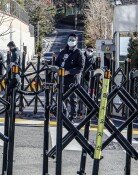National Destiny at Stake
The idea of transferring the administrative capital has raised sharp conflict in the jurisprudence society as well as within legal circles. This is because the transfer is being carried out based on the legal systems special law for establishing the new administrative capital. The struggles against the transfer are also progressing in the form of legal confrontation.
▷Is the result of the presidential election a ratification of the people?
Members of government and the ruling party view the transferring of the administrative capital as having already been ratified by the people because the then presidential candidate Roh Moo-hyun, who presented the issue as one of his public commitments, was elected.
Most jurists and members of the legal profession do not agree. The commitment of the presidential campaign consists of various things, and the transferring of the administrative capital simply belongs as one of those, said Huh Young, a research professor at Myungji University. It cannot be regarded as having been ratified.
▷Is a referendum needed?
Referendum is the most fundamental right of the people, and is the easiest way for them to assist in making a national decision. Since the constitution doesnt designate Seoul as the capital, the administrative capital can be transferred by establishing a law, asserted the government and the ruling party. Additional procedure of referendum is not needed for this.
However, Professor Huh said that in cases that will alter important national symbols such as the capital, the intention of the people should be reflected.
▷Problems in the process of establishing the law of special measure
Heated criticism is now being made of the fact that the government has not collected the opinions of the people and experts in advance.
As a constitutional expert, a professor who wished to remain anonymous said, As the issue should have been discussed among experts and the people concerned, it is now a mess because the discussion begins with it as a presidential commitment. He added, The target of discussion, which must be rich in content in this era of participatory democracy, is being distorted in the form of authoritarianism.
As for this, the government and ruling party assert that such discussion is out of the question. Enough discussion between the opposing parties regarding the procedure of law establishment has been carried out, and the ruling and opposition parties have consented to the law.
▷Whether or not the transfer is fully furnished with legal requisites
Professor Huh pointed out that proceeding with the capital transfer with only the law of special measure, which can be regarded as a sort of procedural law, is unreasonable without any mother law to support it. That is, even if several administrative departments move to other places, practical transfer of the capital seems impossible.
In addition, According to the third clause of the special measure law, transfer has an obligation to contribute to the unity of the people and reflect the wide ranges of public opinion. Whether or not this part of the law is abided by is beyond question.
▷Whether or not the transfer of administrative law infringes upon the basic rights of the people
This problem is closely related to the constitutional appeal, which asserts that the special measure law is unconstitutional. The decree of the constitutional court stipulates that only the person whose basic rights were trespassed upon can file a constitutional petition.
However, Professor Huh said, Infringement cannot be approved because benefits as a citizen living in the capital region, being nothing but a reflective advantage, are not an object of law protecting property rights. Other professors and legal executives agree.
However, some believe that if the administrative capital is moved, people will see their property rights, pursuit of happiness rights, occupational selection rights, and move of residence rights infringed upon. Since the Seoul citizens havent had any chance to defend themselves, said Lim Ji-bong, a professor at Kunkuk University, despite the fact that they would become major victims of the capital transfer, they can file a constitutional petition saying it violated legal procedures.
Soo-Hyung Lee Sang-Rok Lee sooh@donga.com myzodan@donga.com






